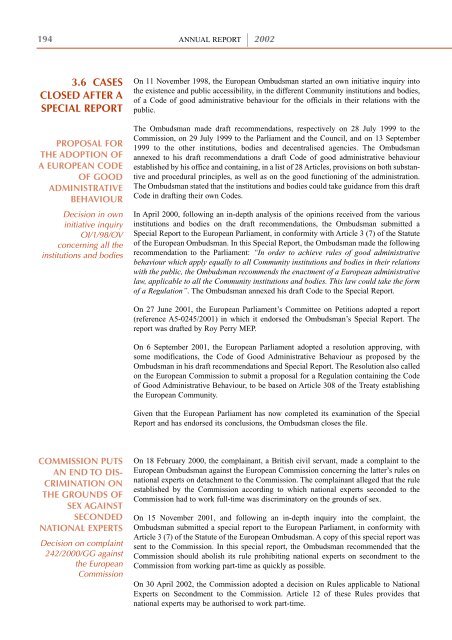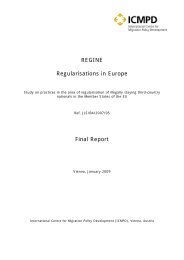Annual report 2002 - EOI
Annual report 2002 - EOI
Annual report 2002 - EOI
Create successful ePaper yourself
Turn your PDF publications into a flip-book with our unique Google optimized e-Paper software.
194 ANNUAL REPORT | <strong>2002</strong><br />
3.6 CASES<br />
CLOSED AFTER A<br />
SPECIAL REPORT<br />
PROPOSAL FOR<br />
THE ADOPTION OF<br />
A EUROPEAN CODE<br />
OF GOOD<br />
ADMINISTRATIVE<br />
BEHAVIOUR<br />
Decision in own<br />
initiative inquiry<br />
OI/1/98/OV<br />
concerning all the<br />
institutions and bodies<br />
On 11 November 1998, the European Ombudsman started an own initiative inquiry into<br />
the existence and public accessibility, in the different Community institutions and bodies,<br />
of a Code of good administrative behaviour for the officials in their relations with the<br />
public.<br />
The Ombudsman made draft recommendations, respectively on 28 July 1999 to the<br />
Commission, on 29 July 1999 to the Parliament and the Council, and on 13 September<br />
1999 to the other institutions, bodies and decentralised agencies. The Ombudsman<br />
annexed to his draft recommendations a draft Code of good administrative behaviour<br />
established by his office and containing, in a list of 28 Articles, provisions on both substantive<br />
and procedural principles, as well as on the good functioning of the administration.<br />
The Ombudsman stated that the institutions and bodies could take guidance from this draft<br />
Code in drafting their own Codes.<br />
In April 2000, following an in-depth analysis of the opinions received from the various<br />
institutions and bodies on the draft recommendations, the Ombudsman submitted a<br />
Special Report to the European Parliament, in conformity with Article 3 (7) of the Statute<br />
of the European Ombudsman. In this Special Report, the Ombudsman made the following<br />
recommendation to the Parliament: “In order to achieve rules of good administrative<br />
behaviour which apply equally to all Community institutions and bodies in their relations<br />
with the public, the Ombudsman recommends the enactment of a European administrative<br />
law, applicable to all the Community institutions and bodies. This law could take the form<br />
of a Regulation”. The Ombudsman annexed his draft Code to the Special Report.<br />
On 27 June 2001, the European Parliament’s Committee on Petitions adopted a <strong>report</strong><br />
(reference A5-0245/2001) in which it endorsed the Ombudsman’s Special Report. The<br />
<strong>report</strong> was drafted by Roy Perry MEP.<br />
On 6 September 2001, the European Parliament adopted a resolution approving, with<br />
some modifications, the Code of Good Administrative Behaviour as proposed by the<br />
Ombudsman in his draft recommendations and Special Report. The Resolution also called<br />
on the European Commission to submit a proposal for a Regulation containing the Code<br />
of Good Administrative Behaviour, to be based on Article 308 of the Treaty establishing<br />
the European Community.<br />
Given that the European Parliament has now completed its examination of the Special<br />
Report and has endorsed its conclusions, the Ombudsman closes the file.<br />
COMMISSION PUTS<br />
AN END TO DIS-<br />
CRIMINATION ON<br />
THE GROUNDS OF<br />
SEX AGAINST<br />
SECONDED<br />
NATIONAL EXPERTS<br />
Decision on complaint<br />
242/2000/GG against<br />
the European<br />
Commission<br />
On 18 February 2000, the complainant, a British civil servant, made a complaint to the<br />
European Ombudsman against the European Commission concerning the latter’s rules on<br />
national experts on detachment to the Commission. The complainant alleged that the rule<br />
established by the Commission according to which national experts seconded to the<br />
Commission had to work full-time was discriminatory on the grounds of sex.<br />
On 15 November 2001, and following an in-depth inquiry into the complaint, the<br />
Ombudsman submitted a special <strong>report</strong> to the European Parliament, in conformity with<br />
Article 3 (7) of the Statute of the European Ombudsman. A copy of this special <strong>report</strong> was<br />
sent to the Commission. In this special <strong>report</strong>, the Ombudsman recommended that the<br />
Commission should abolish its rule prohibiting national experts on secondment to the<br />
Commission from working part-time as quickly as possible.<br />
On 30 April <strong>2002</strong>, the Commission adopted a decision on Rules applicable to National<br />
Experts on Secondment to the Commission. Article 12 of these Rules provides that<br />
national experts may be authorised to work part-time.
















